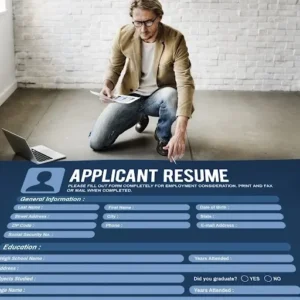Blog
How To Build A Resume
All right, you have all the information for your resume, and now you are ready to put it into play. Where the information goes and how your resume is structured is critical because Human Resource professionals and recruiters spend about 10 seconds skimming your resume before they stop and read it or skip over it. If you don’t grab their attention at this time, your resume will be added to the rejected pile, and you will get the dreaded ‘Dear John’ letter. That’s why structure and formatting are essential. And if the structure of your resume is confusing, HR/recruiters won’t spend the time trying to figure it out. Again, your resume will be tossed to the ‘Dear John’ pile.
Keep your resume structure in a traditional flow (this will be explained in more detail in this article) because HR/Recruiters are creatures of habit when they skim resumes. They are looking for things like titles, length of employment, education/certifications, and critical skills. If they don’t find what they need to see quickly, they will move on to the next resume. Additionally, a well-structured resume shows that you are well-organized.
Your resume template is just as important as the structure of your resume. And in a way, these two (layout and formatting) go hand in hand. Everyone likes an organized document over a cluttered one. And if your resume looks like every other blank-and-white resume from the 80s, you are not helping yourself at all. Use color strategically to impact an employer’s perspective of you. But please avoid the new trendy formats with many graphics and colors on them. A pop of color is excellent and all you need. There are still some ‘old school’ HR/Recruiters who dislike these new resume formats (again, HR/Recruiters are creatures of habit). And these trendier formats sometimes have a more challenging time feeding through Applicant Tracking Systems.

Below is how to build your resume.
Contact Information
This may seem obvious, but remember to add your contact information. This should include your name, phone number, email address, location (city and state), and LinkedIn profile URL link.
Professional Summary
Next up is the professional summary section. This should be a high-level overview of what you will bring to the table.
Please do not mistake the professional summary section for an objective section. Objective sections are outdated and tend to say similar things- “seeking a position where I can utilize my skills…”. Or they will list the type of position that a person is targeting, which is evident because you are applying for those roles and in all honesty not crucial because it doesn’t speak to what you can do or have done.
It is recommended to keep this to four or five sentences.
And do not use the word “I.” For some reason, this is a common mistake. It is the best practice not to speak with “I” in your resume because it is understood that you are talking about yourself.
A couple of examples of topics that this section should cover (depending on your occupation, of course) are leadership, customer service, time management, communication, etc.
Skills and/or Core Competencies
This section is essential for a couple of reasons.
First, it shows employers your top skills at a quick glance.
This is also the easiest place to add keywords to your resume. Keywords are critical in getting your resume past those tricky Applicant Tracking Systems. And a quick tip, the best way to find the keywords is by reviewing the job postings/description. Search through the job posting, find the keywords, and decide for yourself if you feel comfortable listing those skills on your resume. Honesty is the policy, and you should not lie. If a word or phrase keeps popping up in a job posting, add it to your resume. For example, if the job ad says “Client Management” instead of “Relationship Management,” – make sure your document matches.
This section should include your soft skills. If you have technical skills, adding a separate section for your technical abilities is recommended.
Below are a few examples of common keywords for your skills section:
- Communicationon
- Interpersonal Skills
- Team Leadership
- Customer Service Excellence
- Time Management
- Teamwork
- Empathy
- Problem Solving
Professional Work Experience
This section should include information on your current and past work experience.
Begin each section by stating your title, employer name, employer location (optional), and dates of employment, In that order! This should be crystal clear on your resume because HR/Recruiters skim resumes looking for these items. Titles are also important for Applicant Tracking Systems because these systems are looking for titles that match the job posting.
List your experience in reverse chronological order; That means your most recent experience first.
Describe your responsibilities, duties, and accomplishments. Try to use a variety of words. You want your descriptions to sound different. And remember, the more keywords, the more likely your resume will feed through Applicant Tracking Systems. So, instead of always using the word “manage,” try switching it up with words like “lead” or “supervise.”
Try to avoid incorporating company-specific words into your resume.
Whenever possible, use both quantitative and qualitative items. Quantitative items are great because they give an overview of your day-to-day activities. Qualitative things are great because they quantify your accomplishments and responsibilities.
Avoid summarizing or describing what a company you worked with did or does. This does not tell HR anything about what you’ve accomplished. Focus on your skills and strengths, not on the company. If Human Resource professionals or recruiters are unsure what a company does, they will do a quick google search on the company.
Technical Skills
Technical skills have become increasingly important over the years. Especially post-pandemic when the world shifted to a virtual setting. Almost every profession requires some technical skills. This may include everything from systems to programming languages. Common examples include Zoom, Teams, Microsoft Office 365, SalesForce, Trello, Jira, Slack, Monday.com, etc. It is essential to add these skills if you are looking for remote work.
An effortless way to improve your technical skills is by enrolling in a class or watching some good ‘ol YouTube videos. If you notice that most jobs you are applying for require experience with Trello (for example), download the app and go down the YouTube rabbit hole with videos. Most companies do not need you to be an expert; instead, they want to know that you have experience with it.
Volunteer Experience
List your volunteer experience if it is relevant to the positions you want to target or if you do not have a lot of work experience and are trying to “beef” up your resume. Volunteer experience is a fantastic way to show employers your interests, that you are hard-working, and your involvement in the community. On the other hand, if you have extensive work experience, it is best to leave off your volunteer experience.
Education
This section should be short and to the point. A simple bullet list of your degree and the University you attended will do. Unless you’re a recent graduate whose school projects make up most of your work experience, then you can add those to add substance to your resume. Also, you do not need to list your graduation date if it is past ten years. Unfortunately, people over the age of 50 and under the age of 25 can experience age discrimination.
If you have any questions regarding your resume or for resume writing assistance, contact NimoHR. NimoHR offers a resume-building service, aka we will completely reformate and rewrite everything for you.
Latest Posts
- Mastering LinkedIn Skills: How to Choose the Best Skills for Career Growth
- 5 Proven Strategies to Send LinkedIn Invitations That Get Accepted
- Crafting the Perfect Cover Letter for an Internal Position: A Step-by-Step Guide
- Did You Know? Your Resume Reference Page Could Make or Break Your Job Application
- Crafting a Layoff Notice: Effective Communication During Work Shortages
- Mastering Behavioral Interview Questions: Tips and Examples
- In-Demand Skills for 2024: What to Include on Your Resume
- Navigating Career Transitions: Reshaping Your Resume for a New Path
- How to Optimize Your LinkedIn Profile
- Cracking the Job Interview: Insights from NimoHR’s Interview Preparation Sessions
- Using LinkedIn Articles to Showcase Your Expertise
- Creating a Standout Resume for Phoenix Employers: Tips on crafting a resume tailored to the preferences of local Phoenix employers
- Resume Trends for 2024: What You Need to Know
- From First Impression to Final Question: Excelling at the Four Key Interview Evaluation Points
- Behind the Screens: Understanding the Role of ATS in the Hiring Process
- How to Create the Perfect Executive LinkedIn Profile?
- How to Write a Cover Letter That Gets You the Job You Want
- Get Professionally Written Resumes And LinkedIn Profiles
- Top 5 Reasons To Avail Of LinkedIn Resume Writing Services
- Helpful Tips For Writing A Perfect Cover Letter
- How to Ace Your Next Interview
- 15 Things To Leave Off Your Resume
- Applying Strategically and Networking
- Effective Interview Strategies
- The Best Job-Board Sites
- 4 Simple Signs That You Should Quit Your Job
- The most common interview questions & the best way to answer them
- How to beat those pesky Applicant Tracking Systems
- Jump-start your career during the COVID-19 crisis
- Questions to ask in an interview
- Career consulting ROI. Why you should purchase a professional resume writing services
- The Importance of a Company Culture and HR’s Role
- Why companies should offer outplacement services and career coaching
- Interview Tips: Back to the Basics
Categories
Related Posts

Mastering LinkedIn Skills: How to Choose the Best Skills for Career Growth
Introduction Mastering LinkedIn skills is crucial for career growth and professional development. LinkedIn has evolved into a powerful platform where your skills can significantly impact job opportunities and professional success. 1. Conducting a Self-Assessment Understanding your interests and values is crucial for selecting the right skills on LinkedIn. This process begins with self-reflection. Consider what… Continue reading Mastering LinkedIn Skills: How to Choose the Best Skills for Career Growth
Read More
5 Proven Strategies to Send LinkedIn Invitations That Get Accepted
1. Personalization: The Key to Successful Connection Requests Personalized connection requests are crucial for achieving higher acceptance rates on LinkedIn. When you tailor your messages, it shows the recipient that you’ve taken the time to understand their profile and have a genuine interest in connecting. Why Personalization Matters Sending a generic connection request without a… Continue reading 5 Proven Strategies to Send LinkedIn Invitations That Get Accepted
Read More
Crafting the Perfect Cover Letter for an Internal Position: A Step-by-Step Guide
A cover letter for an internal position is a crucial document when you’re seeking a promotion or transfer within your current company. Unlike external cover letters, internal cover letters require a different approach because the hiring managers already know you. You need to highlight your current role, achievements, and how you fit the new job… Continue reading Crafting the Perfect Cover Letter for an Internal Position: A Step-by-Step Guide
Read More